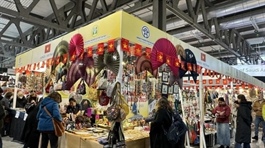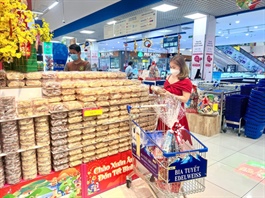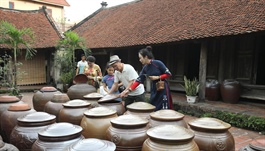Hanoi artisanal villages raise position, disseminate values
Hanoi artisanal villages raise position, disseminate values
Fairs, competitions and festivals have also been organized both domestically and internationally to celebrate the products of craft villages.
Deputy Director of Hanoi's Department of Agriculture and Rural Development, Ta Van Tuong, spoke to Hanoi Ngay Nay (Hanoi Today) about what needs to be done to preserve and develop traditional trades and enhance the competitiveness of handicrafts.
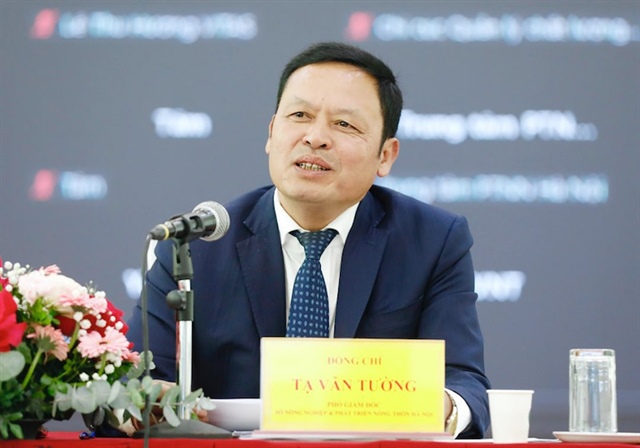
Ta Van Tuong, Deputy Director of the Hanoi Department of Agriculture and Rural Development. Photo: Hanoi Ngay nay |
As the city with the highest number of craft villages in the country, what role do these villages play in the economic landscape of the capital, especially in the context of rural economic restructuring?
The development of craft villages has created numerous job opportunities and increased income for people, including those of working age, the elderly, and people with disabilities.
At present, there are about 100 handicraft villages in Hanoi with annual incomes of VND10-20 billion (US$410,848-US$821,697) each, while 70 other villages each making VND20-50 billion (US$821,697-US$2 million), and 20 others each earning more than VND50 billion (US$2 million) per year, which contribute greatly to the local budget. Workers in handicraft villages earn higher incomes than those involved in farming.
The development of handicraft villages also facilitates community networking, utilizing the values of cultural heritage and traditions and passing on handicraft skills from one generation to another.
Craft villages in Hanoi use materials from different regions of the country, thus increasing the agricultural production value of the regions connected to Hanoi.
The development of artisan villages relies heavily on the contributions of skilled artisans and craftsmen. They play an instrumental role in preserving the essence of traditional crafts, passing on cultural heritage, and serving as mentors for the next generation.
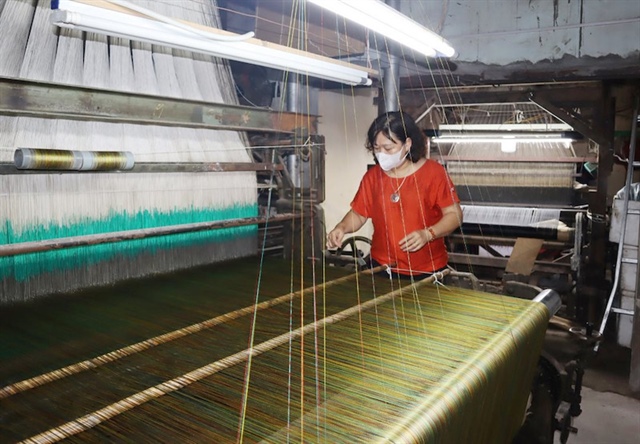
Weaving is being preserved and developed in the silk village of Van Phuc in Ha Dong District. |
Hanoi has 303 state-honored artisans, including 47 women and 256 men. In 2023, the city reviewed 46 applications for the title of "Hanoi Artisan" and submitted 38 applications for the titles of "People's Artisan" and "Excellent Artisan" to the central government for recognition. These artisans serve as the vanguard in preserving cultural traditions and the soul of Vietnamese craftsmanship.
The Hanoi Department of Agriculture and Rural Development has taken various solutions to support the development of artisan villages, including regularly promoting awareness of artisan villages and rural industries, preserving and developing traditional crafts and villages, and enhancing the competitiveness of artisan products.
Fairs, competitions and festivals have also been organized domestically and internationally to celebrate the products of craft villages. The city also provides an environment for artisans and craftsmen to exchange knowledge and experience, preserving the unique cultural characteristics of craft villages.
Recently, at the opening ceremony of the Vietnamese Craft Village Festival, the Ministry of Agriculture and Rural Development and the Hanoi People's Committee awarded prizes to 45 outstanding handicrafts. Notably, all five top prizes were awarded to works and artists from Hanoi.
Is craft village tourism part of Hanoi's strategy to maximize economic benefits and promote the charm of traditional crafts?
Developing tourism helps meet the demand for craft village products and exports and promotes the fine cultural features of Hanoi's craft villages. Recently, some of them have successfully integrated production with tourism, such as Bat Trang Pottery Village, Van Phuc Silk Weaving Village, and Phu Vinh Bamboo and Rattan Weaving Village, along with famous flower and ornamental plant villages like Nhat Tan, Quang Ba, Nghi Tam, Tay Tuu, and Me Linh.
In particular, Bat Trang Pottery Village has continuously innovated production technology and product design, aiming to become a model artisanal village in the capital. Bat Trang is one of the places in Gia Lam District where One Commune One Product (OCOP) products are exhibited and sold.
While Van Phuc Silk Village promotes its products, silk streets combined with complementary industries have been set up to welcome tourists.
In addition, producers are actively learning and using information technology to promote their handicrafts to domestic and international customers.
With immense economic and cultural value, how does Hanoi position and promote the value of its handicraft villages?
Hanoi will continue to play a leading role in assisting provinces and cities to introduce and promote OCOP products and handicrafts in the market, thus motivating the program's strong and sustainable development.
Hanoi is expected to be a pioneer in building and developing the cultural industry. If properly utilized, the artisanal village and craft street systems will not only create cultural value chains but also contribute to the development of culture, tourism, and the dissemination of the capital's traditional culture.
What does Hanoi need to do to create new development space for handicraft villages?
Hanoi aims to become a member of the World Network of Creative Craft Cities and a must-see destination for domestic and international tourists.
The city will proactively cooperate with central agencies and domestic and international organizations to effectively implement craft village conservation and development programs.
The goal is to raise awareness and take innovative and creative measures to improve product design while preserving the essence and soul of the homeland. This will ensure that handicrafts preserve their traditional characteristics while making breakthrough improvements suitable for modern trends, thus asserting the position of Hanoi handicrafts.
Thank you!











